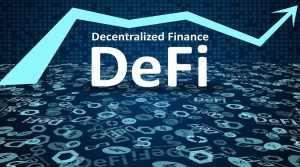Are you familiar with the revolutionary concept of decentralized finance (DeFi)? DeFi has been making waves in the financial industry by providing innovative solutions that empower individuals to have greater control over their financial assets and transactions. In this article, we will delve into the world of DeFi insurance, an essential component of the DeFi ecosystem. We will explore the basics of DeFi insurance, its benefits, and how it works. So, let’s get started!
What is DeFi?
DeFi, short for decentralized finance, refers to the use of blockchain technology and smart contracts to provide financial services in a decentralized manner. It eliminates the need for intermediaries such as banks and brokers, enabling peer-to-peer transactions and greater financial inclusion. DeFi encompasses various applications, including lending, borrowing, trading, and insurance, all built on decentralized platforms like Ethereum.
Understanding DeFi Insurance
DeFi insurance is a form of insurance specifically designed for the decentralized finance ecosystem. It aims to mitigate risks associated with DeFi protocols, smart contracts, and assets stored on blockchain networks. In traditional finance, insurance acts as a safety net, protecting individuals and businesses against unforeseen circumstances. Similarly, DeFi insurance provides a layer of protection for users participating in DeFi activities. DeFi insurance is a form of insurance specifically designed for the decentralized finance ecosystem. It aims to mitigate risks associated with DeFi protocols, smart contracts, and assets stored on blockchain networks. By providing coverage against hacks, exploits, technical failures, and other risks unique to the DeFi ecosystem, it offers users peace of mind and encourages wider adoption of DeFi platforms. Utilizing blockchain technology and smart contracts, DeFi insurance operates in a transparent and automated manner, simplifying the claims process. It plays a crucial role in ensuring the security and trustworthiness of the evolving DeFi space.
The Importance of DeFi Insurance
As the DeFi space continues to expand, so do the risks involved. Smart contracts, although powerful, are not infallible. Vulnerabilities and bugs can lead to financial losses, which can be catastrophic for users. DeFi insurance addresses these concerns by offering coverage against hacks, exploits, technical failures, and other risks unique to the DeFi ecosystem. It provides peace of mind to users, encouraging wider adoption and participation in DeFi platforms.
DeFi insurance holds significant importance in the decentralized finance ecosystem. As the DeFi space continues to expand, so do the associated risks. Smart contracts and blockchain technologies, while innovative, are not immune to vulnerabilities and attacks. DeFi insurance acts as a safety net, providing users with protection against financial losses caused by hacks, exploits, and technical failures. It instills confidence in users, encouraging wider participation and investment in DeFi platforms. By mitigating risks and offering coverage, DeFi insurance plays a crucial role in creating a secure and trustworthy environment for individuals to engage in decentralized financial activities.
How DeFi Insurance Works
DeFi insurance operates through a decentralized model, utilizing blockchain technology and smart contracts. Users can purchase insurance policies by paying a premium in cryptocurrency. These policies are governed by smart contracts that automatically execute claims in the event of specified triggers, such as a hack or a smart contract failure. The claims process is transparent and automated, reducing the need for lengthy manual procedures.
DeFi insurance operates through a decentralized model, leveraging blockchain technology and smart contracts. Users can purchase insurance policies by paying premiums in cryptocurrency. These policies are governed by smart contracts that automatically execute claims in the event of specified triggers, such as hacks or smart contract failures. The claims process is transparent and automated, eliminating the need for lengthy manual procedures. By utilizing decentralized platforms, DeFi insurance ensures that coverage and claims settlement are efficient, secure, and transparent. It provides users with a seamless experience and adds an additional layer of protection to the evolving DeFi ecosystem.

Benefits of DeFi Insurance
- Risk Mitigation: DeFi insurance protects users against financial losses caused by unforeseen events, fostering a more secure and trustworthy DeFi environment.
- Enhanced Confidence: Insurance coverage instills confidence in users, encouraging them to participate and invest in DeFi protocols without the fear of significant losses.
- Transparent Claims: DeFi insurance leverages smart contracts to automate the claims process, ensuring transparency and efficiency in settling claims.
- Lower Barrier to Entry: By providing insurance options, DeFi becomes more accessible to a wider audience, democratizing access to financial services.
Risks and Challenges in DeFi Insurance
While DeFi insurance offers several benefits, it also comes with its own set of risks and challenges. Some of the key concerns include:
- Smart Contract Risks: Despite their benefits, smart contracts are not immune to vulnerabilities and coding errors, which can be exploited by malicious actors.
- Regulatory Uncertainty: DeFi insurance operates in a rapidly evolving regulatory landscape, posing challenges in terms of compliance and legal frameworks.
- Underwriting Limitations: Assessing risks and determining appropriate premiums can be challenging due to the unique nature of DeFi assets and protocols.
Examples of DeFi Insurance Platforms
Several DeFi insurance platforms have emerged, providing users with insurance coverage for their DeFi activities. Some prominent examples include:
- Nexus Mutual: Nexus Mutual offers decentralized insurance for smart contract failures and hacks.
- Cover Protocol: Cover Protocol provides coverage for various DeFi protocols, allowing users to safeguard their assets.
- Armor.Fi: Armor.Fi offers customizable and flexible insurance solutions for DeFi protocols and assets.
How to Choose a DeFi Insurance Provider
When selecting a DeFi insurance provider, consider the following factors:
- Reputation and Track Record: Research the provider’s reputation and history of successfully settling claims.
- Coverage and Policies: Assess the types of risks covered, policy terms, and the limits of coverage.
- Community Feedback: Consider feedback from the DeFi community to gauge user experiences and satisfaction.
Security Measures in DeFi Insurance
DeFi insurance platforms employ various security measures to safeguard user funds and ensure the integrity of their systems. These measures include:
- Smart Contract Audits: Regular audits of smart contracts to identify and fix vulnerabilities before they can be exploited.
- Multi-Signature Wallets: Holding user funds in multi-signature wallets to minimize the risk of unauthorized access.
- Governance and Voting: Empowering users to participate in decision-making processes through decentralized governance and voting mechanisms.
DeFi Insurance and Smart Contracts
DeFi insurance relies heavily on smart contracts to automate policy issuance, premium payments, and claims settlement. Smart contracts provide transparency, efficiency, and immutability, making them ideal for managing insurance processes in a decentralized environment.
Regulatory Considerations in DeFi Insurance
As DeFi insurance operates at the intersection of finance and technology, it is subject to evolving regulatory frameworks. Regulatory considerations include compliance with anti-money laundering (AML) and know-your-customer (KYC) regulations, consumer protection measures, and addressing cross-border legal complexities. Regulatory considerations are an important aspect of DeFi insurance. As the decentralized finance ecosystem continues to grow, regulatory frameworks are evolving to address the unique challenges and risks associated with DeFi activities. DeFi insurance platforms need to navigate compliance requirements such as anti-money laundering (AML) and know-your-customer (KYC) regulations, as well as consumer protection measures. Moreover, cross-border legal complexities and jurisdictional issues must be taken into account. Adhering to regulatory standards not only ensures legal compliance but also enhances trust and credibility in the DeFi insurance sector. Striking a balance between innovation and regulatory compliance will be crucial for the long-term success of DeFi insurance.
Future of DeFi Insurance
The future of DeFi insurance looks promising. As the DeFi ecosystem matures and gains wider adoption, insurance solutions will play a crucial role in minimizing risks and increasing confidence among users. The development of innovative insurance products and the integration of oracles and data feeds will further enhance the effectiveness and coverage of DeFi insurance. The future of DeFi insurance is promising as the decentralized finance ecosystem continues to evolve. As the DeFi space gains wider adoption, insurance solutions will play a crucial role in mitigating risks and increasing user confidence. We can expect the development of innovative insurance products tailored to the unique needs of DeFi participants. Integration of oracles and data feeds will enhance the accuracy and effectiveness of insurance coverage. Additionally, as regulatory frameworks mature, DeFi insurance will adapt to comply with legal requirements, fostering a more robust and regulated environment. Overall, the future holds immense potential for the growth and development of DeFi insurance.
Conclusion
DeFi insurance is a vital component of the decentralized finance ecosystem, providing users with protection against various risks inherent in DeFi protocols. It fosters confidence, mitigates financial losses, and encourages wider participation in the DeFi space. As DeFi continues to evolve, the importance of robust and trustworthy insurance solutions cannot be overstated.
FAQs
1. What is the difference between DeFi insurance and traditional insurance?
DeFi insurance operates on decentralized platforms using blockchain technology and smart contracts, while traditional insurance relies on centralized intermediaries such as insurance companies.
2. Can anyone purchase DeFi insurance?
Yes, DeFi insurance is accessible to anyone with a digital wallet and the ability to transact in cryptocurrencies.
3. Are DeFi insurance policies customizable?
Some DeFi insurance platforms offer customizable policies, allowing users to tailor coverage based on their specific needs.
4. How are claims settled in DeFi insurance?
Claims in DeFi insurance are settled automatically through smart contracts when predetermined triggers are met.
5. Is DeFi insurance secure?
DeFi insurance platforms employ various security measures such as smart contract audits and multi-signature wallets to enhance security and protect user funds.






